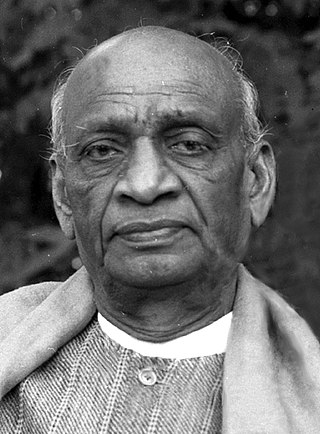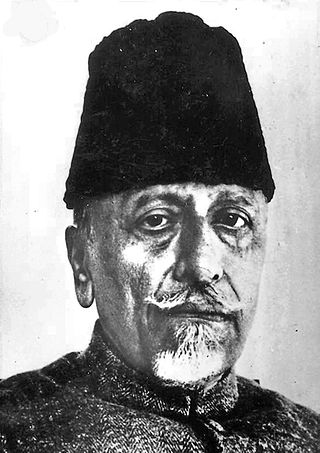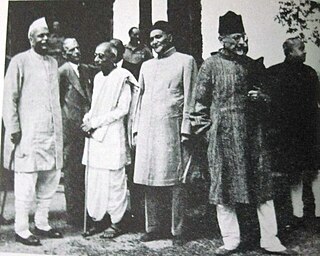Related Research Articles

Vallabhbhai Jhaverbhai Patel, commonly known as Sardar Vallabhbhai Patel, was an Indian independence nationalist and barrister who served as the first Deputy Prime Minister and Home Minister of India from 1947 to 1950. He was a senior leader of the Indian National Congress, who played a significant role in the country's struggle for independence and its political integration. In India and elsewhere, he was often called Sardar, meaning "Chief" in Hindi, Urdu, Bengali and Persian. He acted as the Home Minister during the political integration of India and the Indo-Pakistani War of 1947.

The Partition of India in 1947 was the change of political borders and the division of other assets that accompanied the dissolution of the British Raj in the Indian subcontinent and the creation of two independent dominions in South Asia: India and Pakistan. The Dominion of India is today the Republic of India, and the Dominion of Pakistan—which at the time comprised two regions lying on either side of India—is now the Islamic Republic of Pakistan and the People's Republic of Bangladesh. The partition was outlined in the Indian Independence Act 1947. The change of political borders notably included the division of two provinces of British India, Bengal and Punjab. The majority Muslim districts in these provinces were awarded to Pakistan and the majority non-Muslim to India. The other assets that were divided included the British Indian Army, the Royal Indian Navy, the Royal Indian Air Force, the Indian Civil Service, the railways, and the central treasury. Provisions for self-governing independent Pakistan and India legally came into existence at midnight on 14 and 15 August 1947 respectively.

The All-India Muslim League (AIML) was a political party established in Dhaka in 1906 when some well-known Muslim politicians met the Viceroy of British India, Lord Minto, with the goal of securing Muslim interests on the Indian subcontinent.

Abul Kalam Ghulam Muhiyuddin Ahmed bin Khairuddin Al-Hussaini Azad ; 11 November 1888 – 22 February 1958) was an Indian independence activist, writer and a senior leader of the Indian National Congress. Following India's independence, he became the First Minister of Education in the Indian government. He is commonly remembered as Maulana Azad; the word Maulana is an honorific meaning 'Our Master' and he had adopted Azad (Free) as his pen name. His contribution to establishing the education foundation in India is recognised by celebrating his birthday as National Education Day across India.

The Pakistan Movement was a nationalist and political movement in the first half of the 20th century that aimed for the creation of Pakistan from the Muslim-majority areas of British India. It was connected to the perceived need for self-determination for Muslims under British rule at the time. Muhammad Ali Jinnah, a barrister and politician led this movement after the Lahore Resolution was passed by All-India Muslim League on the 23 March 1940 and Ashraf Ali Thanwi as a religious scholar supported it.

Direct Action Day was the day the All-India Muslim League decided to take "direct action" for a separate Muslim homeland after the British exit from India. Also known as the 1946 Calcutta Killings, it was a day of nationwide communal riots. It led to large-scale violence between Muslims and Hindus in the city of Calcutta in the Bengal province of British India. The day also marked the start of what is known as The Week of the Long Knives. While there is a certain degree of consensus on the magnitude of the killings, including their short-term consequences, controversy remains regarding the exact sequence of events, the various actors' responsibility and the long-term political consequences.
The Partition of Bengal in 1947, part of the Partition of India, divided the British Indian Bengal Province along the Radcliffe Line between the Dominion of India and the Dominion of Pakistan. The Bengali Hindu-majority West Bengal became a state of India, and the Bengali Muslim-majority East Bengal became a province of Pakistan.

The Dominion of India, officially the Union of India, was an independent dominion in the British Commonwealth of Nations existing between 15 August 1947 and 26 January 1950. Until its independence, India had been ruled as an informal empire by the United Kingdom. The empire, also called the British Raj and sometimes the British Indian Empire, consisted of regions, collectively called British India, that were directly administered by the British government, and regions, called the princely states, that were ruled by Indian rulers under a system of paramountcy. The Dominion of India was formalised by the passage of the Indian Independence Act 1947, which also formalised an independent Dominion of Pakistan—comprising the regions of British India that are today Pakistan and Bangladesh. The Dominion of India remained "India" in common parlance but was geographically reduced. Under the Act, the British government relinquished all responsibility for administering its former territories. The government also revoked its treaty rights with the rulers of the princely states and advised them to join in a political union with India or Pakistan. Accordingly, the British monarch's regnal title, "Emperor of India," was abandoned.
The "Day of Deliverance" was a celebration day marked by the All-India Muslim League and others on 22 December 1939 during the Indian independence movement. It was led by Muslim League president Muhammad Ali Jinnah, and intended to rejoice the resignation of all members of the rival Congress party from provincial and central offices in protest over their not having been consulted over the decision to enter World War II alongside Britain.

The Noakhali riots were a series of semi-organized massacres, rapes and abductions, combined with looting and arson of Hindu properties, perpetrated by the Muslim community in the districts of Noakhali in the Chittagong Division of Bengal in October–November 1946, a year before India's independence from British rule.

The Shimla Conference of 1945 was a meeting between the Viceroy of India Lord Wavell and the major political leaders of British India at the Viceregal Lodge in Simla. When it was clear that British intended to leave India, they desperately needed an agreement on what should happen when they leave.
Fatima Begum is a revered woman of the Pakistan Movement.

Amir Chand Bombwal was born in Punjab. He was a journalist, a freedom fighter in the Indian independence movement, a Khudai Khidmatgar and a political leader of the Indian National Congress Party from Peshawar, North-West Frontier Province (NWFP) of British India. He was the founder, editor and publisher of a weekly newspaper called The Frontier Mail and a close associate of Khan Abdul Ghaffar Khan whom it has been claimed he named ‘Frontier Gandhi’.
Pakistan Zindabad is a patriotic slogan used by Pakistanis in displays of Pakistani nationalism. The phrase became popular among the Muslims of British India after the 1933 publication of the "Pakistan Declaration" by Choudhry Rahmat Ali, who argued that the Muslim minority in British India—particularly in the Muslim-majority regions of Punjab, Afghania, Kashmir, Sindh, and Baluchistan—constituted a nation of an irrevocably distinct nature from the rest of India on "religious, social, and historical grounds" owing primarily to the issue of Hindu–Muslim unity. Ali's ideology was adopted by the All-India Muslim League as the "two-nation theory" and ultimately spurred the Pakistan Movement that led to the partition of British India. During this time, "Pakistan Zindabad" became a widely used slogan and greeting within the Muslim League, and following the creation of Pakistan, it was also used as a rallying cry by Muslims who were migrating to the newly independent state from India as well as by those who were already within Pakistan's borders. The slogan is commonly invoked by Pakistani citizens and Pakistani state institutions on national holidays, during times of armed conflict, and on other major occasions.

Subhadra Joshi was an Indian freedom activist, politician and parliamentarian from Indian National Congress. She took part in the 1942 Quit India movement, and later remained the president of the Delhi Pradesh Congress Committee (DPCC). She was from Sialkot.

Muhammad Ali Jinnah was a barrister, politician and the founder of Pakistan. Jinnah served as the leader of the All-India Muslim League from 1913 until the inception of Pakistan on 14 August 1947, and then as the Dominion of Pakistan's first Governor-General until his death.

Viceroy's House is a 2017 fictional drama film directed by Gurinder Chadha and written by Paul Mayeda Berges, Moira Buffini, and Chadha. The film stars Hugh Bonneville, Gillian Anderson, Manish Dayal, Huma Qureshi, and Michael Gambon. It was selected to be screened out of competition at the 67th Berlin International Film Festival.
Anis Kidwai (1906–1982) was a writer, an activist and a politician from Uttar Pradesh. She worked towards peace and the rehabilitation of the victims of India's bloody partition, and spent a majority of her life in service of the newly independent India. She served two terms as a Member of the Parliament in the Rajya Sabha as a part of the Indian National Congress from 1956 to 1962.

Opposition to the Partition of India was widespread in British India in the 20th century and it continues to remain a talking point in South Asian politics. Those who opposed it often adhered to the doctrine of composite nationalism in the Indian subcontinent. The Hindu, Christian, Anglo-Indian, Parsi and Sikh communities were largely opposed to the Partition of India, as were many Muslims.
References
- 1 2 Mohan, Kamlesh (2006). Towards Gender History: Images, Identities, and Roles of North Indian Women. New Delhi: Aakar. pp. 177, 90. ISBN 9788187879657.
- ↑ "164. LETTER TO VALLABHBHAI PATEL" (PDF). The Collected Works of Mahatma Gandhi. 63 (18): 153. 18 January – 19 May 1934. Retrieved 20 June 2013.
- ↑ Guha, Ramachandra (22 August 2005). "They Too Wrote Our History". Outlook. Retrieved 20 June 2013.
- ↑ Shukla, A K (2007). Women Chief Ministers in Contemporary India. New Delhi: APH Publishing Company. p. 12. ISBN 9788131301517.
- 1 2 3 4 "Salam Bibi". The Tribune. 31 July 2005. Retrieved 20 June 2013.
- ↑ Abdelhalim, Julten (2012). Spaces forJihād: Indian Muslims and Conceptions of Citizenship (PDF). Heidelberg: Ruprechts-Karls Universitat Heidelberg. p. 94.
- ↑ Jain, L C (1998). The City of Hope: The Faridabad Story. New Delhi: Concept Publishing Company. p. 40. ISBN 9788170227489.
- ↑ "THE STORY OF NAI TALIM". Archived from the original on 26 July 2012. Retrieved 20 June 2013.
- ↑ Kumar, Virendra (1994). Committees and Commissions in India: 1980 (Vol.18 Part B). New Delhi: Concept Publishing Company. p. 389. ISBN 9788170225119.